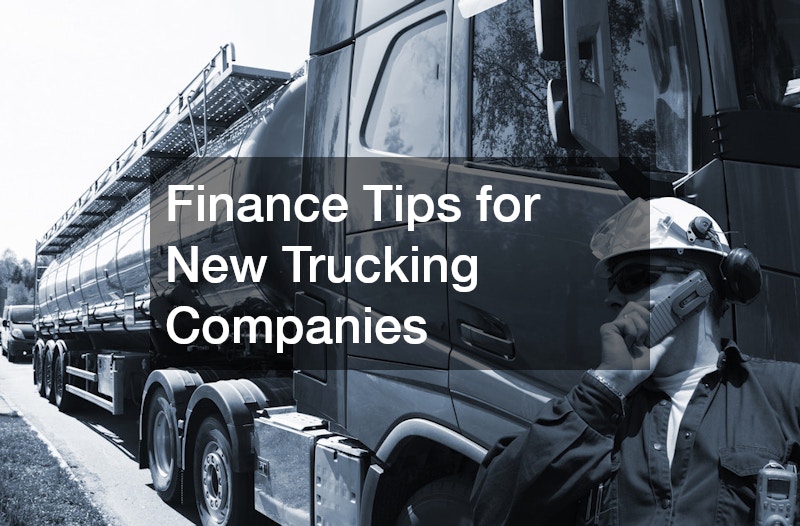
Starting a new trucking company can be a daunting task, particularly when it comes to managing finances. This comprehensive guide addresses the most frequently asked questions and provides practical advice to help new trucking companies navigate the complexities of financial management. From initial funding to cash flow management, these finance tips will help you build a strong financial foundation for your new trucking business.

What Are the Initial Costs for Starting a New Trucking Company?
When starting a new trucking company, there are several initial costs to consider. First and foremost, you will need to purchase or lease vehicles for your fleet. Additionally, you will need to budget for licensing and permits, insurance costs, and operational expenses. It’s important to have a clear understanding of these costs to create a realistic budget for your new trucking company.
Vehicle purchase or leasing is one of the largest expenses for new trucking companies. Make sure to research different options and consider factors such as fuel efficiency and maintenance costs. Licensing and permits are essential to operate legally, so be prepared to budget for these expenses. Insurance costs can vary depending on the size of your fleet and the coverage options you choose.
Initial operational expenses can include administrative costs, employee salaries, and marketing expenses. It’s crucial to account for these costs to ensure that your new trucking company can operate smoothly from the start. By carefully planning and budgeting for these initial costs, you can set your business up for success.
How to Secure Financing for Your Trucking Company
Securing financing for your new trucking company can be a challenging process, but there are several options available. Business loans from banks or financial institutions are a common way to secure funding for new trucking companies. Additionally, you may be eligible for grants or subsidies from government programs or private organizations. Used trailers can offer a cost-effective solution.
Private investors can also provide funding for your new trucking company in exchange for equity or a return on their investment. If you have personal savings, you may choose to invest in your own business. Consider all of these options carefully and choose the one that best suits your financial needs and goals.
Regardless of the financing option you choose, it’s essential to have a strong business plan and financial projections to present to potential lenders or investors. This will demonstrate your commitment to success and help you secure the funding you need to launch your new trucking company.

What Financial Records Should Be Maintained?
As a new trucking company, it’s crucial to maintain accurate financial records to track your business’s performance and make informed decisions. Income statements provide a snapshot of your company’s revenue and expenses over a specific period. Balance sheets detail your assets, liabilities, and equity, giving you a comprehensive view of your company’s financial health.
Cash flow statements track the flow of cash in and out of your business, helping you manage your company’s liquidity. It’s important to keep detailed records of your income and expenses, including receipts for all purchases and transactions. By maintaining these financial records, you can monitor your new trucking company’s financial performance and make strategic decisions to support growth and profitability.
Regularly reviewing and updating your financial records is essential for staying organized and ensuring compliance with accounting standards and tax regulations. Consider using financial management software to streamline record-keeping processes and ensure accuracy in your financial reporting.
How to Effectively Manage Cash Flow
Managing cash flow is critical for the success of your new trucking company. Implementing invoicing strategies, such as offering prompt payment incentives or sending out invoices in a timely manner, can help improve your cash flow. Monitor your expenses closely to identify areas where you can reduce costs and improve profitability.
Having emergency funds set aside for unexpected expenses can provide a financial safety net and help you weather any financial challenges that arise. Negotiating favorable payment terms with your clients can also improve your cash flow by ensuring a steady stream of revenue. By proactively managing your cash flow, you can position your new trucking company for long-term success.
Consider working with a financial advisor or accountant to develop a cash flow management plan tailored to your new trucking company’s specific needs. Review and update this plan regularly to adapt to changing market conditions and ensure your business remains financially stable.

What Are the Best Practices for Budgeting?
Setting realistic projections is the foundation of effective budgeting for new trucking companies. Consider factors such as market demand, competition, and operating costs when creating your budget. Track your expenses carefully to identify areas where you can reduce costs and optimize your budget for maximum efficiency.
Regular financial reviews can help you monitor your new trucking company’s performance against budgeted targets and make adjustments as needed. By analyzing variances and identifying trends, you can make informed decisions to improve your business’s financial health. Adjust your budget based on performance data to ensure that your new trucking company remains competitive and profitable.
Seek guidance from financial professionals or industry experts to develop a comprehensive budgeting strategy for your new trucking company. By following best practices for budgeting and continually evaluating your financial performance, you can position your business for sustained growth and success in the competitive trucking industry.
How to Reduce Operating Costs
Reducing operating costs is essential for maximizing profitability and competitiveness in the trucking industry. Implement fuel efficiency measures, such as route optimization and regular maintenance, to minimize fuel consumption and lower costs. Schedule routine maintenance for your fleet to prevent breakdowns and expensive repairs. Consider cost-effective CDL truck driving courses.
Optimizing your routes can help reduce mileage and transportation time, saving fuel and labor costs. Consider purchasing used trailers or small route trucks to lower initial investment costs. Explore bulk purchasing options for fuel, parts, and supplies to leverage cost savings for your new trucking company.
Partnering with reputable diesel truck repair services or heavy-duty fleet truck repair specialists can help you reduce maintenance costs and minimize downtime for your fleet. By proactively managing your operating costs, you can improve your new trucking company’s profitability and competitive position in the market.

How to Handle Taxes for Trucking Companies
Understanding your tax obligations is crucial for maintaining compliance and avoiding costly penalties for your new trucking company. Keep detailed records of all income and expenses for tax purposes, including receipts and invoices. Consult with a tax professional to determine which deductions and credits you may be eligible for.
Working with tax professionals can help you navigate complex tax regulations and maximize savings for your new trucking company. Establish a system for record-keeping and documentation to ensure that you can easily prepare and file your taxes. By staying informed about tax laws and regulations, you can minimize tax liability and optimize your new trucking company’s financial performance.
Consider investing in tax preparation software or hiring a tax professional to streamline the tax filing process for your new trucking company. Keep abreast of changes in tax laws and regulations that may impact your business and adjust your tax strategy accordingly. By staying proactive and organized, you can effectively manage taxes and ensure compliance for your new trucking company. If you purchase a diesel used truck, be sure to track any potential costs
What Insurance Do New Trucking Companies Need?
Insurance is essential for protecting your new trucking company from potential liabilities and risks. Liability insurance covers damages and injuries caused by your vehicles, protecting your business from legal claims. Cargo insurance provides coverage for goods transported by your fleet, safeguarding against loss or damage.
Physical damage coverage insures your vehicles against accidents, theft, or vandalism, ensuring that your fleet is protected in case of unforeseen events. Comprehensive insurance plans may offer additional coverage options, such as roadside assistance or rental reimbursement. Work with an insurance agent to assess your new trucking company’s insurance needs and select the right coverage options for your business.
Regularly review your insurance policies to ensure they provide adequate coverage for your new trucking company’s operations and assets. Consider partnering with reputable insurance providers specializing in trucking industry coverage to tailor a comprehensive insurance plan for your business. By investing in the right insurance coverage, you can protect your new trucking company from financial risks and liabilities, including heavy duty fleet truck repair.
How to Build and Maintain a Financial Safety Net
Building a financial safety net is essential for safeguarding your new trucking company against unexpected expenses or economic downturns. Establish emergency savings to cover short-term cash flow shortages or operational disruptions. Maintain credit lines or access to financing options to provide additional liquidity in times of need.
Consider investing in low-risk assets, such as CDs or money market accounts, to protect your new trucking company’s capital and generate passive income. Diversify your income streams by offering additional services, such as a transloader or freight hauling, to supplement your primary revenue. By diversifying your income sources, you can reduce dependency on a single market or client and strengthen your new trucking company’s financial resilience.
Regularly review your financial safety net and adjust as needed to adapt to changing market conditions or business challenges. Consult with financial advisors or accountants to develop a comprehensive financial risk management strategy for your new trucking company. By building and maintaining a robust financial safety net, you can protect your business from uncertainties and position it for long-term success.
How to Perform Financial Forecasting
Financial forecasting is essential for planning and strategizing the growth of your new trucking company. Projecting revenue and estimating expenses can help you set realistic financial goals and track your company’s performance. Analyze market trends and industry data to anticipate changes in demand and adjust your forecasts accordingly. Understand when you need diesel truck service.
Regularly review your financial projections and analyze variances to identify areas for improvement and optimization. Incorporate forecasting data into your budgeting and financial planning processes to align your new trucking company’s operations with strategic objectives. Consult with industry experts or financial analysts to refine your forecasting techniques and enhance the accuracy of your projections.
Utilize financial forecasting software or tools to streamline data analysis and improve the precision of your predictions. Stay informed about industry trends and economic indicators that may impact your new trucking company’s financial performance. By performing rigorous financial forecasting, you can make informed decisions and drive sustainable growth for your business.
How to Evaluate and Improve Financial Performance
New trucking companies can key performance indicators (KPIs) and financial ratios is essential for assessing the health of your new trucking company. Analyze metrics such as revenue per mile, freight turnover rate, and operating ratio to gauge your business’s efficiency and profitability. Compare your performance against industry benchmarks to identify areas for improvement and optimization.
Conduct regular financial audits to verify the accuracy and reliability of your new trucking company’s financial records. Implement internal controls and processes to ensure compliance with accounting standards and regulatory requirements. Seek feedback from financial advisors or consultants to evaluate your business’s financial performance and implement best practices for improvement.
Review your financial performance regularly and adjust strategies based on performance data and feedback. Continuously monitor your KPIs and financial ratios to track progress and make informed decisions for your new trucking company. By evaluating and improving your financial performance, you can enhance profitability and sustain long-term success in the competitive trucking industry.
What Financial Software is Recommended for Trucking Companies?
Investing in accounting software can streamline financial record-keeping and reporting for new trucking companies. Choose a software solution that is user-friendly and offers features such as invoicing, expense tracking, and financial reporting tools. Budgeting tools can help you create and manage budgets effectively, monitor expenses, and track financial performance for a freight hauling company.
Utilize invoicing platforms to generate invoices, track payments, and manage client accounts efficiently. Look for features such as automated reminders and payment processing to streamline invoicing processes for your new trucking company. Financial analytics software can provide insights into new trucking companies financial data, helping you make informed decisions and optimize performance. Be sure to track any visitors to a semi truck repair shop, ensuring you can properly budget.
Explore different financial software options tailored to the trucking industry, such as fleet management software or logistics platforms. Consider cloud-based solutions to facilitate remote access and collaboration for your new trucking company’s financial team. By leveraging the right financial software, you can enhance efficiency, accuracy, and transparency in your financial operations.
Navigating the financial landscape of a new trucking company can be challenging, but with proper planning and the right financial strategies, you can establish a strong foundation for your business’s success. By understanding and implementing the tips discussed in this article, new trucking companies can effectively manage their finances, reduce costs, and ensure long-term profitability. Stay proactive, seek professional advice when needed, and continually revisit your financial plans to adapt to the evolving business environment for new trucking companies.



